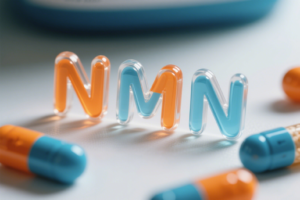+86 571 8659 2517
+86 180 5841 8258
info@zmuni.com

Nicotinamide mononucleotide (NMN) has long attracted global attention as a promising ingredient in health supplements and functional foods, due to its potential role in supporting cellular metabolism, healthy aging, and overall well-being. In recent weeks, key regulatory developments driving in major markets have brought clarity to NMN's legal status, creating new opportunities for the supplement industry. United States: FDA Restores NMN's Dietary Supplement Status On December 9, 2025, the U.S. Food and Drug Administration (FDA) published a response letter on Regulations.gov, addressing submissions by Chinese company SyncoZymes (Shanghai) Co., Ltd. regarding β-nicotinamide mononucleotide (NMN). *Image source: Regulations.gov The

On December 15, 2025, according to China's National Medical Products Administration (NMPA), Nabsolute Co., Ltd. completed the notification of its first new cosmetic ingredient (NCI) in China under NCI number “国妆原备字20250159”. The ingredient, Hyaluronic Acid/Polyisopropylacrylamide Copolymer, is notable as the first NCI from Thailand to be approved in China. *image source: China NMPA We are honored to have partnered with Nabsolute on this project. Leveraging our professional end-to-end services—including preliminary feasibility analysis, advising on potential application scenarios for the new ingredient, and guidance on documentation preparation—we supported the company throughout the successful completion of the entire notification process. We

The global online cosmetics market is estimated at USD 22.02 billion in 2025 and is expected to reach USD 30.81 billion by 2030, growing at a CAGR of 6.95%. Asia-Pacific is the fastest-growing region, while North America remains the largest market. Most online sales occur through third-party retailer platforms (95% in 2024), though company-owned platforms are also expanding. This growth is fueled by personalization, virtual try-ons, convenience, social media influence, and rising demand for premium and organic products. Given this rapid expansion, understanding and navigating the regulatory landscape is crucial for brands seeking to sell cosmetics internationally. This article provides a

On December 16, 2025, China's National Institutes for Food and Drug Control (NIFDC) released two cosmetic technical guidance documents, including the Technical Guidelines for Anti-Hair Loss Products (Trial) and Technical Guidelines for Research on Efficacy-Related Ingredients in Anti-Hair Loss Cosmetics (Trial), together with the corresponding Q&A. The draft versions of these documents were previously released for public consultation in September 2025. Key Highlights from the Q&A: Q1: What ingredients are considered efficacy-related ingredients for anti-hair loss cosmetics? A: Efficacy-related ingredients for anti-hair loss cosmetics are divided into two categories: Anti-hair loss agents, which are single ingredients or components within ingredients

From December 10 to 16, 2025, 6 new cosmetic ingredients (NCIs) have completed notifications with China’s National Medical Products Administration (NMPA). The technical requirements for the 6 new cosmetic ingredients mentioned above have not been disclosed, and they have not yet entered the safety monitoring period. Notably, three of the six NCIs were notified by overseas companies from Italy, South Korea, and Thailand. C18-22 Hydroxyalkyl Hydroxypropyl Guar According to Lamberti's official website, C18-22 Hydroxyalkyl Hydroxypropyl Guar, marketed as ESAFLOR® HM 22, is a hydrophobically modified bio-based ingredient with notable emulsifying properties and sensory characteristics. It can be used with other emulsifiers to create a variety

On December 15, 2025, China's National Institutes for Food and Drug Control (NIFDC) released the Technical Guidelines for Updating New Cosmetic Ingredient Notification Information. The document was initially opened for public consultation in March 2025. Alongside the guidelines, NIFDC also published a set of Q&A to clarify key points and assist industry stakeholders in implementing the updated notification requirements. Key Highlights from the Q&A: Scope The guidelines apply to updating information for new cosmetic ingredients before they are included in the Catalogue of Used Cosmetic Ingredients. Updates should generally not occur within one month of the

On December 11, 2025, China's National Institutes for Food and Drug Control (NIFDC) released two draft technical guidance documents on the naming of new cosmetic ingredients for public consultation, namely the Technical Guidelines for the Naming of Plant-Derived New Cosmetic Ingredients (Draft for Comments) and the Technical Guidelines for the Naming of Fermentation-Derived New Cosmetic Ingredients (Draft for Comments). The public consultation period is open until December 26. Detailed information are as follows: Technical Guidelines for the Naming of Plant-Derived New Cosmetic Ingredients (Draft for Comments) It applies to the study and determination of Chinese names for new cosmetic ingredients derived from plants, as well as new

On December 12, 2025, China National Medical Products Administration (NMPA) issued a three-year action plan (2026–2028) to enhance the quality management systems of cosmetics enterprises. The initiative aims to improve product safety, boost industry competitiveness, and promote high-quality development in China's cosmetics sector. The plan focuses on several key areas: Enhancing Corporate Quality Systems Emphasizes enterprise responsibility and accountability of key personnel. Strengthens oversight of registration and filing processes and ensures production consistency controls are effectively implemented. Strengthening Risk Control and Compliance Promotes comprehensive product lifecycle management. Encourages batch release procedures, self-inspections, and corrective actions to
+86 571 8659 2517
+86 180 5841 8258
info@zmuni.com